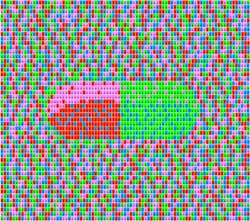New Drug reduces negative Memory

Genome-based identification of drugs.<br>Image: University of Basel <br>
In a subsequent pharmacological study with one of the identified compounds, the scientists found a drug-induced reduction of aversive memory. This could have implications for the treatment of posttraumatic stress disorder, which is characterized by intrusive traumatic memories. The findings have been published in the latest edition of the magazine PNAS.
In the last decade, the human genome project has led to an unprecedented rate of discovery of genes related to humane disease. However, so far it has not been clear to what extent this knowledge can be used for the identification of new drugs, especially in the field of neuropsychiatric disorders. The research groups of Prof. Andreas Papassotiropoulos and Prof. Dominique de Quervain of the Psychiatric University Clinics, the Department of Psychology and the Biozentrum of the University of Basel performed a multinational collaborative study, in order to analyze the genetic basis of emotionally aversive memory – a trait central to anxiety disorders such as posttraumatic stress disorder. In a gene-set analysis the scientists identified 20 potential drug target genes that are involved in the process of remembering negative events.
Known Antihistamine shows Effect
In a double-blind, placebo-controlled study and based on the results of the genetic analysis, the scientists examined a compound that interacts with one of the previously identified gene products. Surprisingly, the said compound is a known antihistamine. A single dose of the drug led to significant reduction of memory recall of previously seen aversive pictures; however, it did not affect memory of neutral or positive pictures. These findings could have implications for the treatment of posttraumatic stress disorder.
With this study, the scientists were for the first time able to demonstrate that human genome information can be used to identify substances that can modulate memory. «The rapid development of innovative methods for genetic analysis has made this new and promising approach possible», says Papassotiropoulos. The scientists are now planning subsequent studies: «In a further step, we will try to identify and develop memory enhancing drugs», explains de Quervain. The scientists hope to provide new input for the development of urgently needed improved drugs for the treatment of neuropsychiatric diseases.
Company for clinical Applications
In order to bring their findings to clinical application, de Quervain and Papassotiropulos founded the company GeneGuide Ltd. this year. The company has specialized in the human genome-based research approach and the discovery of new drugs for neuropsychiatric diseases. This novel approach has been met with great interest by the pharmaceutical industry, since so far the development of improved neuropsychiatric drugs has been rather disappointing.
Original Citation
Andreas Papassotiropoulos, Christiane Gerhards, Angela Heckc, Sandra Ackermann, Amanda Aerni, Nathalie Schicktanz, Bianca Auschra, Philippe Demougin, Eva Mumme, Thomas Elbert, Verena Ertl, Leo Gschwind, Edveena Hanser, Kim-Dung Huynh, Frank Jessen, Iris-Tatjana Kolassa, Annette Milnik, Paolo Paganetti, Klara Spalek, Christian Vogler, Andreas Muhs, Andrea Pfeifer, and Dominique J.-F. de Quervain
Human genome-guided identification of memory-modulating drugs
PNAS 2013; published ahead of print October 21, 2013 | doi: 10.1073/pnas.1314478110
Further Information
Prof. Dr. Andreas Papassotiropoulos, Tel. +41 61 267 05 99, Email: andreas.papas@unibas.ch
Prof. Dr. Dominique de Quervain, Tel. +41 61 267 02 37, Email: dominique.dequervain@unibas.ch
Media Contact
All latest news from the category: Health and Medicine
This subject area encompasses research and studies in the field of human medicine.
Among the wide-ranging list of topics covered here are anesthesiology, anatomy, surgery, human genetics, hygiene and environmental medicine, internal medicine, neurology, pharmacology, physiology, urology and dental medicine.
Newest articles

Innovative 3D printed scaffolds offer new hope for bone healing
Researchers at the Institute for Bioengineering of Catalonia have developed novel 3D printed PLA-CaP scaffolds that promote blood vessel formation, ensuring better healing and regeneration of bone tissue. Bone is…

The surprising role of gut infection in Alzheimer’s disease
ASU- and Banner Alzheimer’s Institute-led study implicates link between a common virus and the disease, which travels from the gut to the brain and may be a target for antiviral…

Molecular gardening: New enzymes discovered for protein modification pruning
How deubiquitinases USP53 and USP54 cleave long polyubiquitin chains and how the former is linked to liver disease in children. Deubiquitinases (DUBs) are enzymes used by cells to trim protein…



